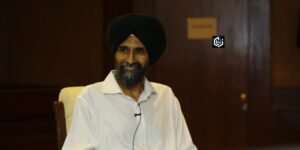Enhancing Information Exchange in the Offshore Wind Industry!
As the globe struggles with climate change and increasing demands for cleaner energy sources, leaders in this sector are those who lead in determining how energy will be generated in the future. The global drive for innovative energy solutions is led by the offshore wind energy industry.
The complexity of this sector necessitates collaboration with stakeholders, including local communities, private businesses, and governments. Beyond just producing energy, these initiatives have an impact on global economic strategy, environmental legislation, and technology developments.
Dennis Jul Pedersen is the CEO of Port Esbjerg, a major offshore wind company in Europe. Under his leadership, the port has developed into a key center for the green transition, supporting a number of offshore wind projects that greatly advance the green goals of both Denmark and Europe.
With a master mariner’s background and a wealth of onshore and offshore expertise, he offers a distinct viewpoint to his position. He places a strong emphasis on cooperation between various industry participants to promote agreement and propel expansion that benefits both companies and society as a whole.
Initiatives like the North Sea Port Alliance, which seeks to improve information exchange and assistance for the offshore wind sector, demonstrate his dedication to innovation.
In order to ensure that all actors can adjust and prosper in a constantly changing industry landscape, his leadership concentrates on nurturing competition and identifying strategic positions that improve the port’s capabilities.
Let’s know more about his journey:
Champion of Offshore Wind Development
Dennis is the CEO of Port Esbjerg, a pivotal hub for offshore wind energy in Europe. He entered the port sector motivated by a deep commitment to facilitating the green transition, which he views as a collective effort requiring political will and collaboration among various stakeholders. Recognizing the complexities inherent in this transition, he emphasizes the necessity of consensus-building among diverse actors to foster growth and development that benefits both businesses and society at large.
Under his leadership, he has positioned Port Esbjerg at the forefront of renewable energy initiatives, playing a crucial role in the expansion of offshore wind capacities. His extensive background in shipping, oil and gas services, and offshore wind equips him with the expertise needed to drive Port Esbjerg’s mission forward.
The Evolution of Port Esbjerg
Established 155 years ago, Port Esbjerg has continually adapted to meet the demands of various markets. Originally focused on livestock exports, the port has transformed into a multifaceted hub, now hosting 200 companies involved in marine services, fisheries, oil and gas, and renewable energy.
This evolution reflects the port’s commitment to innovation and responsiveness to market changes. He plays a crucial role in fostering collaboration among these diverse businesses. His vision is to align their goals, ensuring that their collective efforts yield significant socio-economic benefits for both the port and its stakeholders.
A Journey of Transformation in Leadership
Dennis’s career is marked by a unique trajectory that began as a master mariner and naval lieutenant. Over a decade in the offshore industry saw him ascend through various ranks, ultimately transitioning to onshore roles. Since 2008, he has held senior management positions, culminating in his current role as CEO of a significant political and economic entity in Denmark. His international experience spans countries like Scotland, Norway, Abu Dhabi, and Singapore, enriching his perspective on global maritime operations.
He identifies himself as a transformational leader who embraces change while ensuring stability. He believes that sustainable results are achieved through perseverance rather than abrupt upheaval. His leadership style has been shaped by the challenges of managing diverse stakeholders and navigating complex decision-making processes.
A Catalyst for Denmark’s Economic Growth
Dennis envisions the port as a key player in Denmark’s economic growth and sustainability efforts. Positioned by the North Sea, the port is strategically located to harness the region’s potential as a green powerhouse for Europe, particularly through substantial offshore wind developments.
He emphasizes that these advancements rely heavily on robust port infrastructure, which Port Esbjerg is uniquely equipped to provide. With ongoing investments and an expanding role in renewable energy, the port is set to benefit from the anticipated growth in offshore wind projects over the coming decades, solidifying its importance in Denmark.
Fostering Innovation and Collaboration
Dennis emphasizes the importance of action learning as a strategy to foster innovation and collaboration within his team and the broader maritime ecosystem. He recognizes that many stakeholders in the port have collaborated for decades, making change challenging yet essential in a dynamic market.
By promoting collaborative learning through shared experiences and knowledge, he aims to cultivate a culture that embraces necessary transformations while maintaining stability.
Establishing the North Sea Port Alliance
Dennis takes pride in the establishment of the North Sea Port Alliance, an initiative aimed at enhancing collaboration within the offshore wind sector. Recognizing the critical role ports play in Europe’s green transition, he initiated this alliance to facilitate knowledge sharing among various stakeholders.
By bringing together experienced actors who have worked together for decades, the alliance aims to support the offshore wind industry effectively.
Embracing Digitalization
Dennis highlights the pivotal role of digitalization and technology in shaping the future of Port Esbjerg. The port has initiated two key developments: a carbon management system that continuously monitors the carbon footprint of ships in the port, enabling investments in certified green shore power to significantly reduce emissions, and a digital twin of the offshore wind port.
This development allowed them to develop optimum, which meant that after implementing the changes and investments, they could install three times more offshore wind from the port compared to what they had achieved in the previous two decades.
Talent Management
Dennis acknowledges the challenges of talent management in Denmark’s public ports, where traditional employee incentives may be limited. He emphasizes that working at a port offers diverse responsibilities and interactions not typically found in private enterprises. This environment allows employees to engage deeply with decision-making processes that prioritize stakeholder value over mere profit.
To navigate the complexities of their roles, he believes that fostering motivation through meaningful tasks is essential. By focusing on creating value for the port’s various stakeholders, he aims to ensure that Port Esbjerg has the necessary skills and expertise to meet future challenges effectively.
Navigating Stakeholder Engagement
Dennis underscores the significance of stakeholder engagement in transforming inaction into action within the port ecosystem. He identifies two primary approaches: setting clear goals to seize opportunities and addressing risks that necessitate collaboration among multiple stakeholders.
As a port authority, he recognizes the critical gatekeeping role he plays, which requires a shift from traditional top-down management to initiating collaborative efforts. By critically examining his role within this complex system, he aims to foster relationships with local authorities, industry partners, and the public, ensuring that all stakeholders work together towards common objectives for the port’s success.
Advice for Aspiring Maritime Leaders
Dennis advises aspiring leaders in the maritime industry to recognize the changes they cannot control and instead focus on championing their organizations’ adaptation to these shifts. As consumer demand for greener transport increases, the maritime sector must evolve to meet these expectations.
He emphasizes that the industry is inherently international, requiring navigation through various complexities driven by global trade. Future leaders should foster a culture of adaptability and resilience within their organizations, ensuring they are well-prepared to respond to the evolving landscape and contribute positively to both their organizations and surrounding communities.
Achieving Work-Life Balance
Dennis maintains a healthy work-life balance by embracing his passion for sailing, often spending days on the water to recharge. He finds joy in continuous learning and critical thinking, having completed his Doctor of Business Administration, which deepened his appreciation for acquiring new knowledge.
He values the insights gained from engaging with academics and the diverse individuals he meets through his work. By prioritizing both personal interests and professional growth, he effectively balances the demands of leading Port Esbjerg while fostering a mindset of lifelong learning and adaptability in his leadership approach.
The Future of the Maritime Industry
Dennis shares his insights on the future of the maritime industry, highlighting the complexities of operating in a globally competitive environment driven by supply and demand. Events such as strikes and shipping disruptions can significantly impact supply chains, emphasizing the need for robust risk management strategies. As the industry faces increasing pressure to reduce greenhouse gas emissions, the green transition becomes paramount. Regulatory measures, like the European carbon tax, will compel maritime stakeholders to invest in greener fuels and technologies.
Ports and shipowners alike face the dilemma of timing their investments in sustainable infrastructure. Early investments may lead to underutilization, while delays could result in losing business to more environmentally friendly ports. Therefore, it is crucial for the maritime industry to proactively engage in the green transition while receiving clear commitments from governments regarding regulatory changes.
He believes that the European Union is at the forefront of promoting these necessary changes, providing a framework within which ports can operate effectively. The industry’s ability to adapt to these evolving demands will determine its future viability and success. By embracing innovation and sustainability, maritime leaders can navigate the challenges ahead and contribute positively to global trade and environmental goals.
Legacy and Vision
Dennis envisions a lasting legacy at Port Esbjerg centered on its pivotal role in the offshore wind sector. As one of Europe’s key hubs, the port has participated in 62 offshore wind projects, positioning itself as a leader in the transition to renewable energy. The North Sea’s vast potential for offshore wind is crucial for reducing Europe’s dependence on fossil fuels, making Port Esbjerg essential not only for Denmark but for the continent’s green goals.
He aims to ensure that the port contributes significantly to climate initiatives while fostering economic growth. By focusing on sustainable practices and infrastructure development, he seeks to create a model for how ports can support both environmental and economic objectives. Ultimately, his legacy will reflect a commitment to innovation and collaboration, ensuring that Port Esbjerg remains integral to Denmark’s long-term sustainability and economic prosperity.




